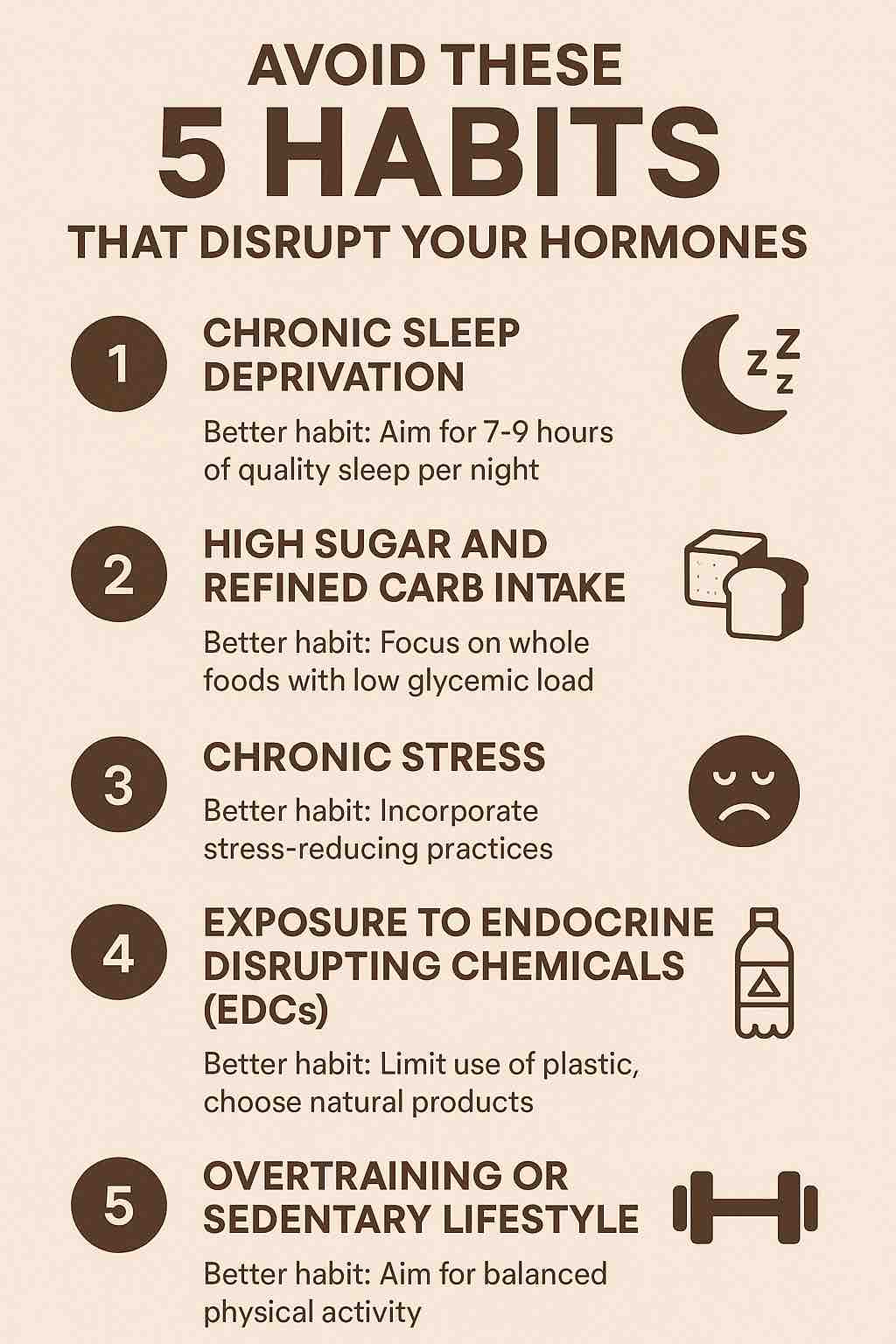
Your body is a symphony of hormones—tiny chemical messengers that regulate everything from your sleep and mood to metabolism and fertility. But what happens when that harmony turns to chaos?
Whether you’re constantly tired, gaining weight without explanation, or feeling emotionally out of whack, your daily habits might be throwing your hormones into disarray. And the scariest part? You might not even realize it.
Here are 5 sneaky habits that could be disrupting your hormones—and how to fix them before they hijack your health.
💤 1. Chronic Sleep Deprivation: The Silent Saboteur
Think sacrificing sleep is harmless? Think again. Sleep isn’t just about rest—it’s when your body recalibrates.
What it does:
Lack of quality sleep messes with cortisol (your stress hormone), reduces melatonin, and interferes with insulin and hunger hormones like leptin and ghrelin.
The result:
Weight gain, cravings, poor blood sugar control, low libido, and foggy thinking.
Fix it:
Get 7–9 hours of uninterrupted sleep. Create a wind-down ritual, limit screens at night, and keep a consistent schedule—even on weekends.
🍩 2. Overloading on Sugar and Refined Carbs
That daily donut or oversized latte may be doing more than just expanding your waistline.
What it does:
Refined sugar spikes insulin, leading to blood sugar crashes and insulin resistance. This throws off estrogen, testosterone, and even thyroid hormones.
The result:
Mood swings, acne, energy crashes, and long-term hormonal imbalances like PCOS.
Fix it:
Eat whole, unprocessed foods. Favor fiber-rich carbs, healthy fats, and clean protein to keep insulin steady and hormones happy.
😰 3. Living in a State of Constant Stress
Stress isn’t just a mental weight—it’s a full-body endocrine disruptor.
What it does:
Chronic stress floods your system with cortisol. Over time, this suppresses reproductive hormones (like estrogen and testosterone) and can blunt your thyroid function.
The result:
Fatigue, irritability, infertility, and low motivation.
Fix it:
Incorporate stress-reducing habits like deep breathing, walking in nature, journaling, or guided meditation—even 10 minutes a day makes a difference.
🧴 4. Daily Exposure to Hormone-Hijacking Chemicals (EDCs)
Your shampoo bottle might smell like lavender—but it could be laced with chemicals mimicking estrogen.
What it does:
Endocrine-disrupting chemicals (EDCs) like BPA, phthalates, and parabens interfere with hormone receptors, often pretending to be hormones themselves.
The result:
Hormone imbalance, estrogen dominance, infertility, and developmental issues.
Fix it:
Switch to clean, natural products. Avoid plastics (especially when heated), ditch synthetic fragrances, and read labels like your health depends on it—because it does.
🏋️♀️ 5. Overtraining or Not Moving at All
Exercise is medicine—but too much or too little is a prescription for imbalance.
What it does:
Sedentary behavior leads to sluggish metabolism and insulin resistance. Overtraining without recovery spikes cortisol and suppresses reproductive and thyroid hormones.
The result:
Fatigue, muscle breakdown, menstrual issues, and burnout.
Fix it:
Balance is key. Aim for a mix of strength training, cardio, mobility work, and full rest days. Listen to your body—it knows when enough is enough.
💡 Final Thoughts: Balance Over Perfection
Hormones don’t ask for perfection—they ask for consistency, awareness, and care. By shifting even a few of these habits, you give your body the space it needs to heal, harmonize, and thrive.
Remember, hormonal health is foundational—when your hormones are balanced, everything else falls into place.
FAQs
1. How do I know if my hormones are imbalanced?
Common signs include fatigue, mood swings, weight gain, sleep disturbances, acne, irregular periods, low libido, and brain fog. A blood test can confirm specific hormonal levels.
2. Can fixing my sleep actually balance my hormones?
Yes. Quality sleep helps regulate cortisol, insulin, melatonin, and sex hormones. It’s one of the fastest ways to start restoring hormonal balance naturally.
3. How quickly can dietary changes affect my hormones?
Some people see improvements within a few days (like better energy and mood), while deeper changes (like menstrual regulation or weight loss) can take weeks to months.
4. Are all sugars bad for hormones?
No. Natural sugars from whole fruits (with fiber) are fine in moderation. It’s the refined sugars and processed carbs that spike insulin and lead to hormone disruptions.
5. What are EDCs and where are they found?
Endocrine Disrupting Chemicals (EDCs) are found in plastics (BPA), cosmetics, cleaning products, canned foods, and some pesticides. They interfere with hormone function.
6. How can I reduce EDC exposure without spending a fortune?
Start small: switch to a glass water bottle, avoid microwaving plastic containers, choose fragrance-free products, and read labels for ingredients like “parabens” and “phthalates.”
7. Is overtraining really that harmful to hormones?
Yes. Excessive training without proper recovery increases cortisol and can suppress estrogen, progesterone, and testosterone—especially in women.
8. Can stress really impact fertility?
Absolutely. Chronic stress affects ovulation, menstrual cycles, and sperm production by altering the HPA (hypothalamic-pituitary-adrenal) axis.
9. What exercise routine supports hormone health?
A balanced mix of strength training, moderate cardio (like walking), yoga, and rest days supports metabolism, reduces stress, and maintains hormonal equilibrium.
10. Should I take supplements to fix hormone imbalances?
Supplements can help, but they aren’t a fix-all. Addressing root causes—sleep, diet, stress, and lifestyle—should always come first. Consult a healthcare provider before starting any new regimen.









